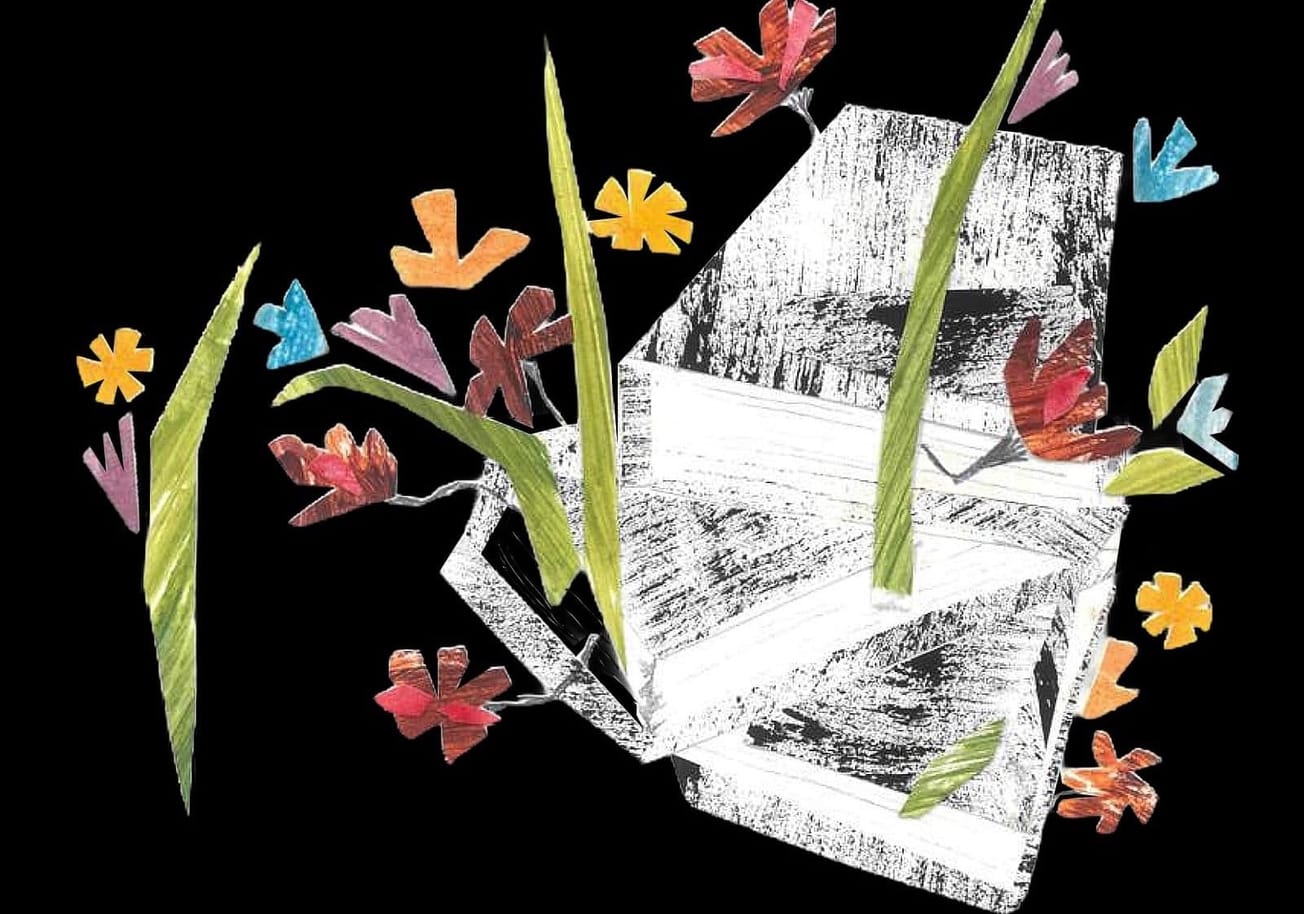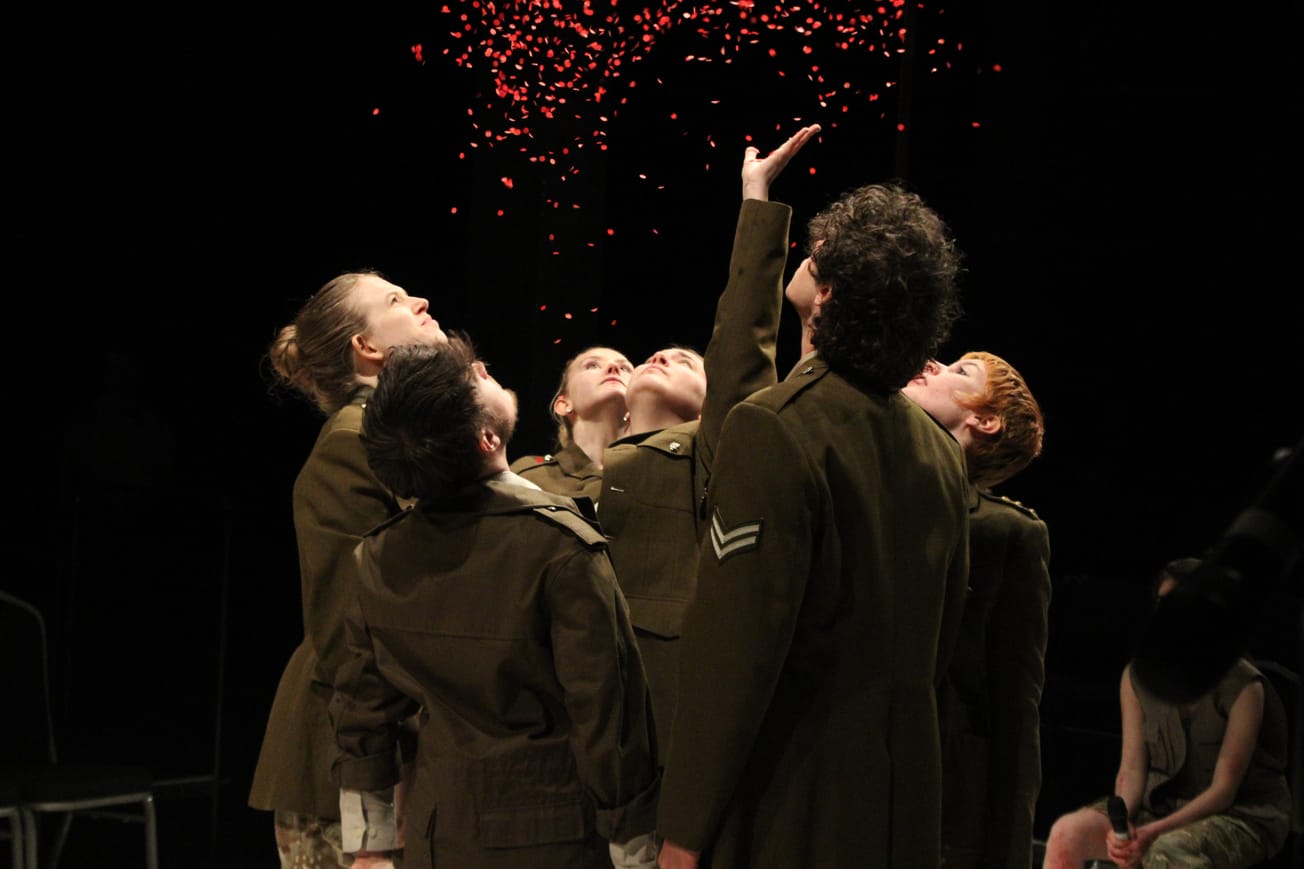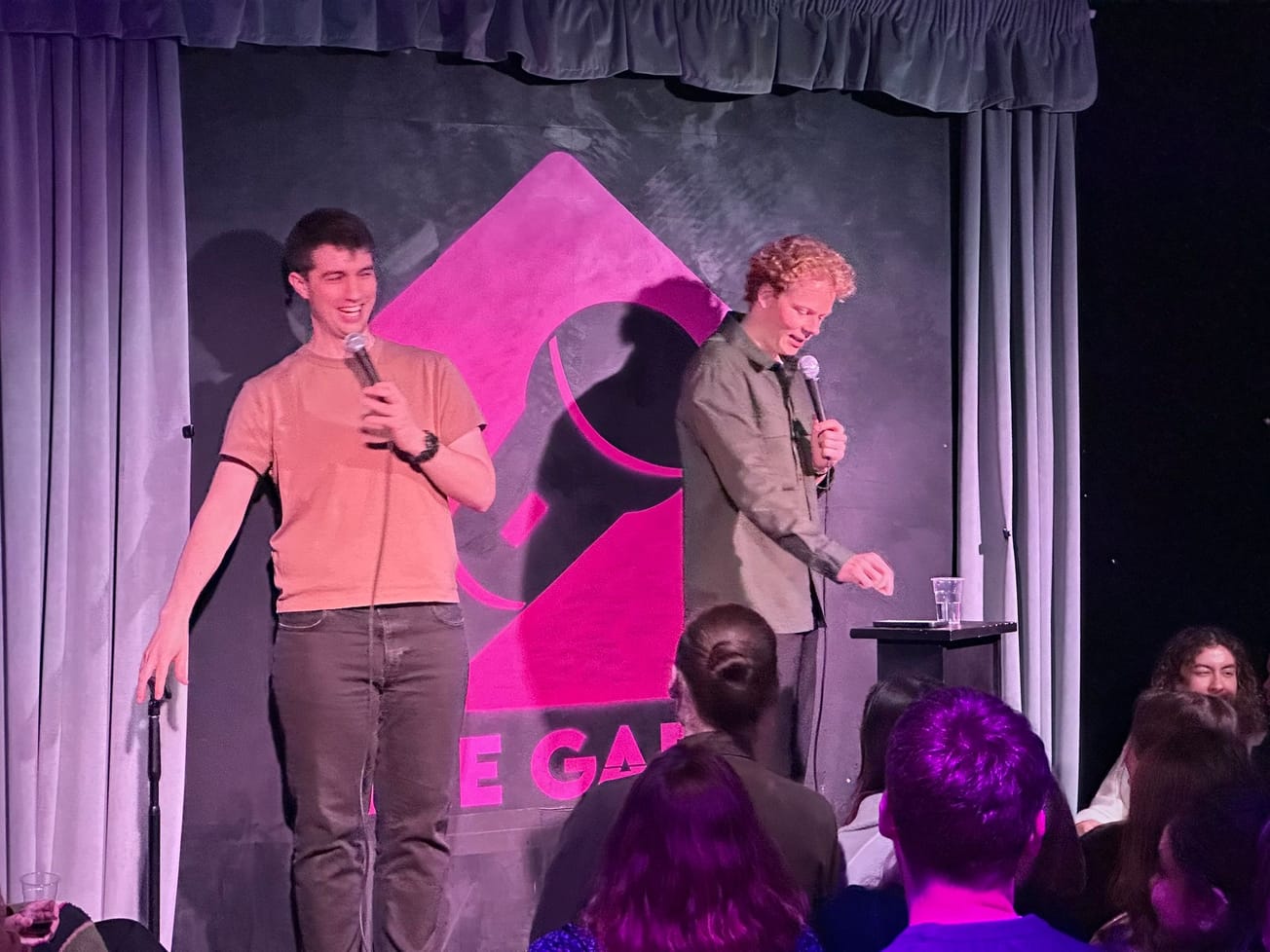By Joseph Draper, third year History
Joseph Draper sits down with up-and-coming student comedian Alex Kitson to chat about the balance between studying and comedy, sleep deprivation and telling jokes to a room full of newborn children.
I was sitting in the most remote corner of the Hawthorne’s cafe and listening to the high-minded chatter of academics relishing their Friday evening pints when Alex Kitson, final year politics student and amateur comedian, arrived to meet me. He had spent the day telling jokes to a room full of newborn babies (and, admittedly, their mothers), which is exactly the sort of thing that you would expect someone like Kitson to be doing on a weekday afternoon: ‘It’s a perfect match. Mothers and comedians have nowhere to be in the day. We were made for eachother.’
To say that Kitson has had an atypical university experience is an understatement. As well as being a committee member in the University’s sketch comedy society, Revunions, he writes and and performs his own stand-up comedy and runs his own weekly comedy night at the Kingsdown Vaults. He has worked his way into the bulging underbelly of the Bristol comedy circuit where he performs alongside up-and-coming comedians from the amateurish to the semi-professional.
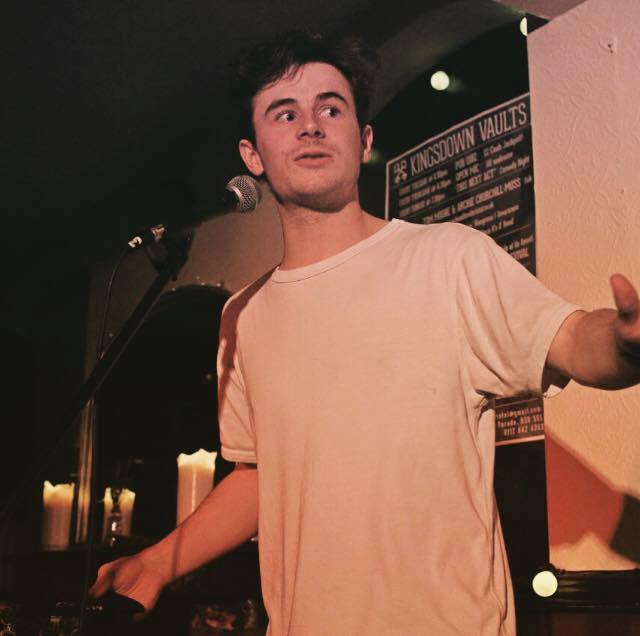
Alex Kitson
A born performer on stage and off, Kitson’s face is a visual screen of comedic potential which jitters and seethes with energetic charm and animation. He is distracted, at first, by a small and adorable child who is giggling and smiling at him through the glass panelled door; clearly, she’s a fan.
Originally from Tiverton in Devon, a place he describes as a ‘place you go on the way to somewhere nicer,’ Kitson first discovered his love for comedy when he was 13 at the age when the boys and girls in his school first started to get together for parties: ‘Well, I was never invited but the next day everyone at school was talking about Michael Mcintyre’s Hello Wembley which they’d watched at the party the night before. I’d never heard of Michael McIntyre or watched stand-up in my life, so that night, I went home and watched it and I remember thinking it was the greatest thing I’d ever seen. There were these fireworks going off in my head. Just being able to make a career of standing there, going ‘blah-blah-blah’ and having people laugh seemed ideal.’
But if laughter is a source of nourishment for Kitson then it can also be a source of pain. We talk extensively of the deep emotional fallout which is associated with this powerful addiction and I get a glimmer of those lonesome and anxious days when nobody laughs at his jokes: ‘the lows can be very low. I’ve driven miles to ge to some of the worst gigs I’ve done without getting paid and have gotten no laughs. Then I’ve driven all the way home by myself, just thinking “What are you doing, you dick?”’ Alongside this, however, he describes the feeling of elation, like a literal high, when an audience has laughed at a joke he’s written and his face is suddenly alight with the luminous residue of those moments.
"I try to balance the night so it's not completely shit"
Given the pressures associated with comedy and performance, I ask Kitson if he feels comics are especially vulnerable to feelings of anxiety and issues with mental health: ‘I think problems like that have a lot to do with what comedians are trying to do. If you’re trying to make a living then it’s very competitive and there’s a lot of pressure associated with that. There’s always someone better than you and you want to be on that next rung.’ For Kitson, such issues do not have to be entirely negative but could be utilized through his art: ‘These struggles should never be seen as essential, but comedy requires someone to look at the world from a different angle and I think that having something a bit different about your experience gives you some leverage to do that.’
If a continuum exists, Kitson is certainly at the far end of the extreme when it comes to extracurricular activities and his singularity of passion is a rare find. I cannot help but to feel inspired and just a little bit threatened by the wealth of his energy and I wonder how he manages to balance his comedy life with his university life. He laughs at this. ‘Oh God!’ he says in mock despair, ‘you should see the state of my room. I’m so tired.’
Does that become a problem?
‘Sometimes you do end up burning the candle at both ends but at least I don’t have a job. I often compare myself to other people I know on the circuit who have day jobs and kids- that’s 40 hours a week that they’ve got to be at. So actually, compared to everybody else, I’m charmed. But to do comedy means sacrificing a lot of other stuff. My New Year's resolution is to sleep more, I think. I need to get better at that.’
His determination is impressive. Very few people dedicate so much of their time to a creative endeavour like comedy: ‘There’s actually too many people like me, you’ll be surprised to know! Way too many posh middle class boys trying to be comedians’
I wonder if he has any advice for students who may feel apprehensive about balancing multiple commitments alongside their university work: ‘I would absolutely encourage people to give something a go. Lots of people leave the structure of school and come to university and they just feel purposeless because they don’t know what to do. Pursuing a passion makes things more interesting. I just think people need to be coaxed out and a lot of what holds them back is fear. If you shy away from the world then it becomes harder and harder to break out of that cycle. But go out there and do something – anything – it will make you happy. Some of the societies here are seriously fantastic resources and if you’re studying at Bristol then you’re in an incredibly privileged position. Now’s your time to do it.’
During his second year at university, Kitson and another comedian established their own fortnightly comedy night, This Next Act, which hosted amateaur and up-and-coming comics from throughout the Bristol circuit. After returning from the Edinburgh Fringe last summer, Kitson was surprised to hear that the pub where they ran the show had closed down and that his partner was moving to China. A little perplexed, no doubt, Kitson now had to find a new pub. He heard through a fellow comedian that the Kingsdown Vaults was looking for a slot to be filled. Kitson has been running a weekly show there ever since. The format is split down the middle; half of the show acts as a classic open mic night whilst the four remaining slots are filled by established comedians in the circuit.
Given that anyone can request to perform at This Next Act, I wonder what Kitson’s views are on the fine line between blocking material which is unacceptable and being overly restrictive: ‘It’s a huge risk allowing people to deliver material that you’ve never heard before. I’ve had people complain about certain jokes at This Next Act but I will never try to censor the jokes that another comedian makes.’
This seems like a far cry from the cautious approach to comedy by Revunions and other student comedy societies, where safe space policies restrict the kinds of jokes that students can make: ‘With regards to the Revunions, that’s a different issue. I think it has been resistant to ideas that some people might construe as offensive. There are some jokes that comedians are just not able to tell there. Personally, I think that for an SU society that’s the right way to go. My basic stance is that you have to know your crowd. Student crowds don’t like anything that they perceive as offensive, whether or not they actually think it’s offensive or not. They just don’t want to be seen laughing at certain jokes. Bad jokes don’t go down well. Offensive jokes don’t go down well. Bad offensive jokes are an absolute lead balloon.’
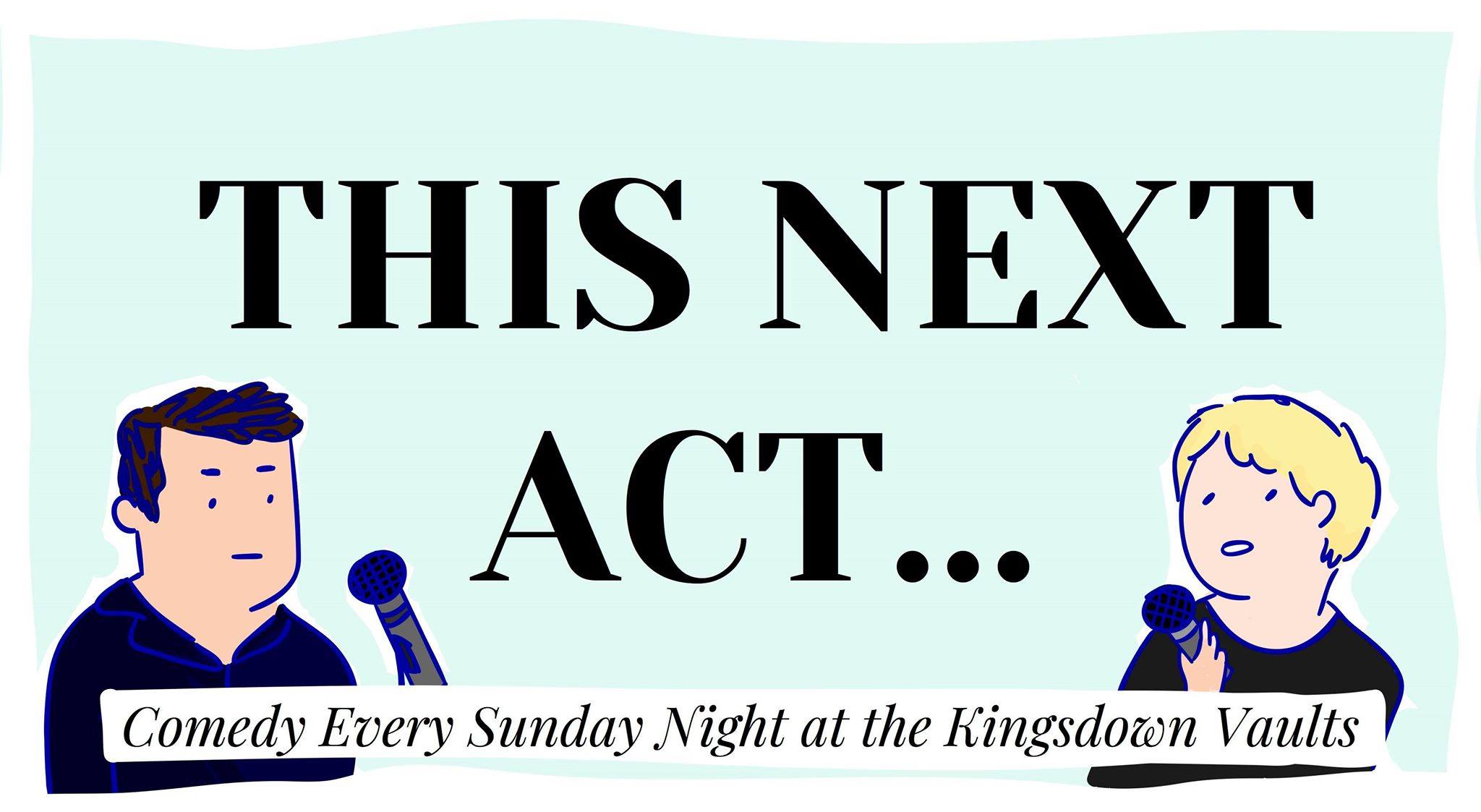
Facebook / This Next Act
A large part of what makes This Next Act so appealing is it’s perfectly raw and conversational quality. The atmosphere is relaxed and impishly chaotic and the performance often spills beyond the laxen barrier which hangs between comedian and audience, who both seem united in a symbiotic and complementary balance. Kitson’s jitterbug style is charming on stage and off - an inherent idiosyncrasy, no doubt, but one which has been refined and utilized in his comedy.
‘I try to balance the night so that it’s not completely shit,’ he tells me, giggling. ‘I think that really works because you get to see the full range of comedy that’s out there. From the really amateurish to the really experimental. If you want something that’s consistently good then – you know – go pay for it. The bits which are more chaotic are the most entertaining. We try not to edit our podcast which we film on the night at all, which means you can listen to me dying on my arse. You just don’t see that on T.V so it offers something different. Bristol’s in the middle of a comedy boom and there are people who I’ve gigged with who I know will be on T.V in the future – people on the edge of professionalism who practice new material at my nights – and every student in Bristol has the opportunity to see them right now for free at This Next Act.’
You can catch This Next Act for free on Sunday evenings at 7:30 in The Kingsdown Vaults or on any of the major streaming services. Chortle comedy award winner, Riordan DJ, will be performing on February 10th. Find more information here.
(Featured image credits: Alex Kitson)
Are you going to This Next Act? Let us know in the comments below or on social media.


